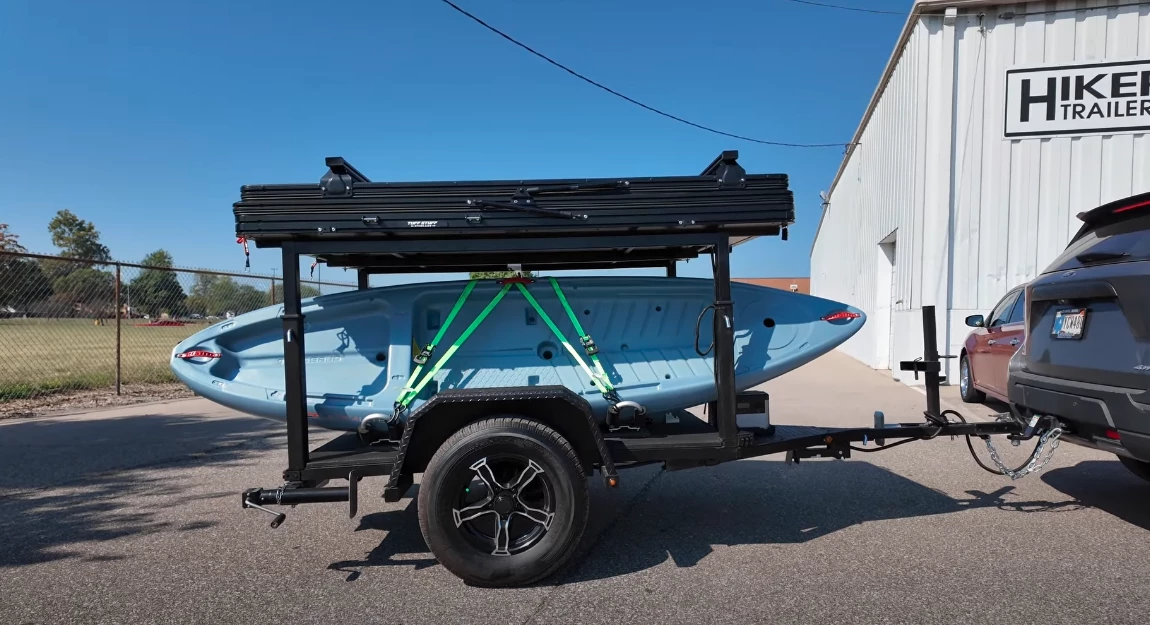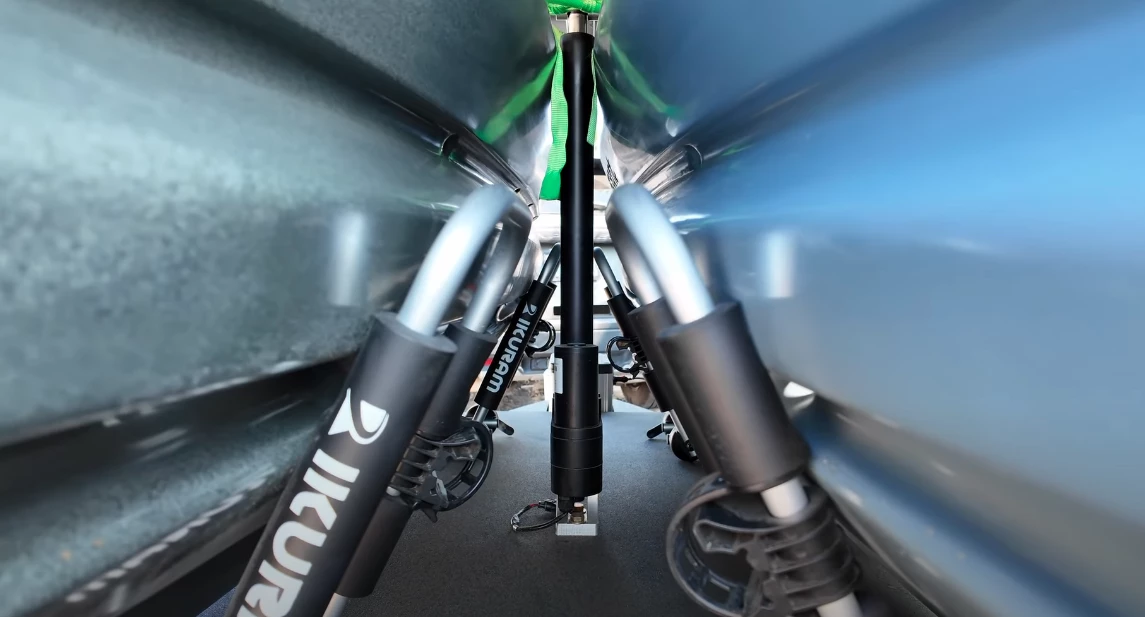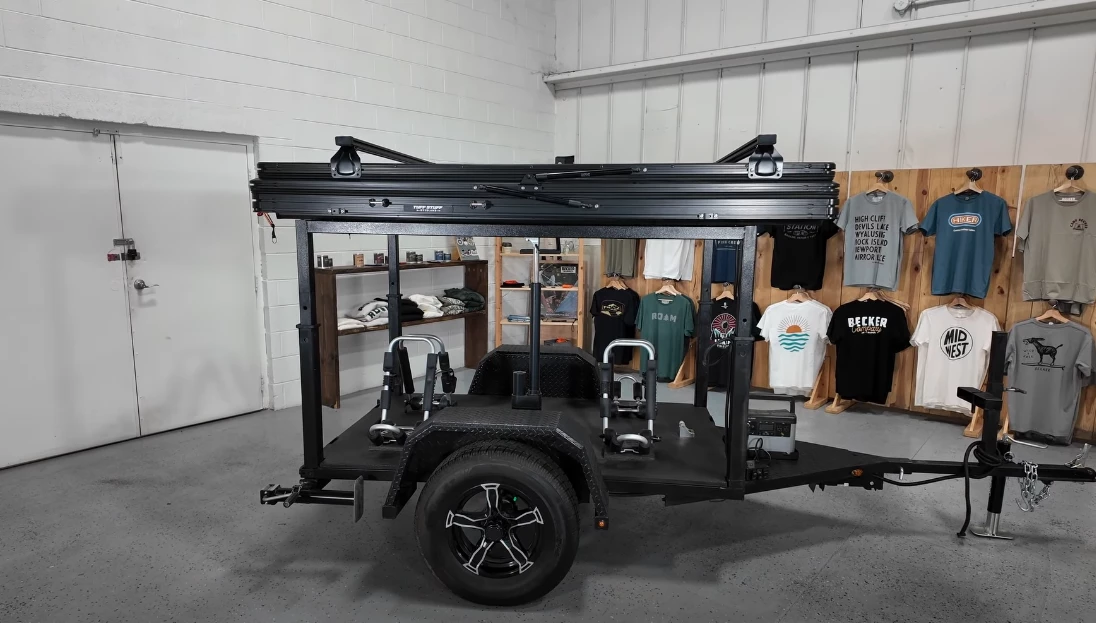On the very same day it introduced its cheapest teardrop-style trailer in years, American trailer builder Hiker also debuted something entirely different. Taking a detour from its decade-long history of building tear-flavored squaredrops, it simultaneously launched the GearLoft, an ultra-versatile skeletal hauler designed to carry gear as large as kayaks and canoes. Buyers will enjoy two full levels of gear carry and an optional electric-lift penthouse tent.
The GearLoft immediately reminded us of a few trailers we've looked at in the past, particularly the similarly named TrailLoft (based on the Go-Easy) from SylvanSport.
However, it's ultimately more similar to myriad DIY builds out there, pairing a wide-open flatbed with an above-bed gear rack beefy enough to hold a rooftop tent loaded with a few campers.
Other similar production trailers we've looked at tend to incorporate a solid cargo box, pickup truck-like tub or flatbed paired with a camper box instead of a simple wall-less pass-through deck.

The beauty of the flat, open GearLoft deck is that it provides more space for common oversized equipment like kayaks and paddleboards. Hiker takes this advantage one step further in adding a length-adjustable tongue that can slide forward to accommodate even longer gear, such as 12-foot (3.6-m) canoes. The three-position tongue system offers up to 42 inches (107 cm) of added length, adjusting total trailer length from a minimum of 10.5 feet (3.20 m) to a maximum of 14 feet (4.3 m).
For those who tend to carry tall gear (or piles of cargo stacked high), the GearLoft exoskeleton also adjusts between 55 and 70 in (140 and 178 cm) in total height, providing more space over top the 4 x 6-ft deck. The height adjustment is a standard feature, and buyers can add an optional electrically actuated lift to automate the process.

The GearLoft's upper bars are designed to be used as the basis for a sort of second story on the trailer, offering a sturdy 400-lb (181-kg) dynamic load rating and 850-lb (385-kg) static capacity. In addition to carrying more of one's sports gear of choice – kayaks, bicycles, snowboards or the like – the top bars can be used for racks and mounts for alternative gear, such as water tanks like Yakima's Roadshower, cargo boxes, awnings and rooftop tents.
The last option, of course, will turn the GearLoft from a basic cargo trailer into simple micro-camper, and the 850-lb static weight rating means that it can support a few campers as well as the tent itself and the mounting system. Hiker sells a number of rooftop tent models and shows the debut GearLoft with a double-action hardshell from Tuff Stuff Overland.

This trendy style of Z-framed rooftop tent travels to camp as a low-profile hardshell, and gives users the option of opening it halfway into a wedge or popping it fully into a roomier, breezier camping cube. Tuff Stuff offers the two-person Alpine 51 and larger two-/three-person Alpine 61, both with the same style of aluminum shell that collapses to a sleek 8-in ride height (20 cm, excluding the rooftop crossbars).
GearLoft buyers who go with one of the Tuff Stuff tents can still carry some gear up high thanks to the included crossbars on the roof. The Alpine series crossbars offer an impressive 728-lb (330-kg) load capacity, but that will fall quickly when mounted atop the GearLoft trailer owing to the tents' respective 248- and 274-lb (113- and 124-kg) weights. So you'll only have up to 152 lb (69 kg) of capacity while staying within the trailer's 400-lb dynamic load rating, still plenty for carrying a couple bikes, boards, or a kayak or two.
The GearLoft weighs in around 625 lb (284 kg) dry and has a 1,900-lb (862-kg) gross vehicle weight rating for a payload of 1,275 lb (578 kg). It rides on a straight axle cushioned by leaf springs and offers 11.5 inches (29 cm) of ground clearance.

The GearLoft trailer itself starts at US$4,499 as a basic, empty exoskeleton hauler with lower gear deck, and Hiker estimates a price range of $5,624 to $9,423 for the micro-camper variant, depending on selected rooftop tent and hardware. Hiker says it can install customers' own gear carrier/mounts to the trailer for $75 per level or source gear mounts for customers.
Source: Hiker Trailers







